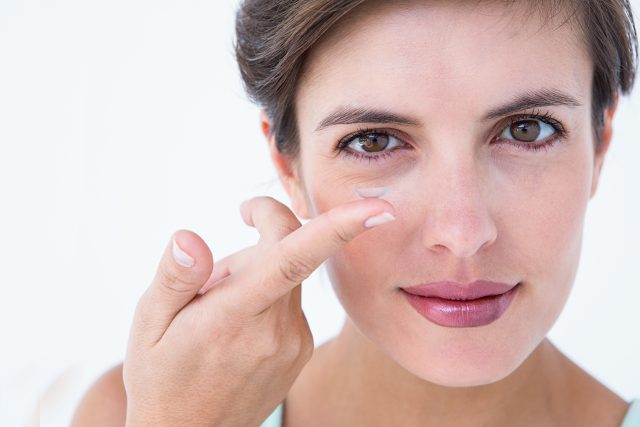Bifocal and Multifocal contact lenses are lenses designed to give you good vision for both distance and near, when lenses for distance alone don't meet your needs. They are available in both soft and gas permeable (GP) materials.
Multifocal Orthokeratology is another option. Special lenses are worn to sleep that re-shape your eye so you can see at distance and at near all day, without having to use contact lenses during the day at all.
Multifocal Orthokeratology is a new advance in Ortho-K treatment. It enables adults who now need different powers to see at distance and at near, to see both distances (i.e. driving) and near (i.e. reading) without having to wear eyeglasses. Beginning at about 40, people find they can see at distance through their eyeglasses or contact lenses, but have difficulty at near, for example reading or working on the computer. Most eye doctors will then recommend a bifocal or progressive eyeglass lens. Multifocal Ortho-K enables people to wear special lenses at night while sleeping, and they are then able to see clearly at distance and near, without the risks associated with LASIK.
Bifocals, Multifocals - What's the difference?
Bifocal contacts lenses (like bifocal eyeglass lenses) have two powers, one for seeing clearly at distance, as when one is driving, and one for seeing clearly up close, like reading. Multifocal contact lenses, are similar to progressive eyeglass lenses in that they have a range of powers for seeing clearly far away, up close and everywhere in between. ("Multifocal" is also a catch-all term for all lenses with more than one power, including bifocals.)
They are available in various forms:
- Soft: daily, monthly, quarterly multifocal. We can even provide soft multifocal with astigmatism.
- Gas Permeable and Scleral Multifocal Lenses offer the benefit of crisper vision without the lenses drying. This is a healthier system because the lens material allows more oxygen through plus the advantage of the material does not bind the chemical component in your tears than bind to the lens material, much as plaque binds to your teeth even though you brush them as needed.
Will multifocal contact lenses work for me?
 Most people are happy with the vision that multifocal contact lenses provide. Some people, however, find that they are not seeing as clearly as they would like and may be bothered by glare at night or not being able to see small print. Although as multifocal lenses have become more sophisticated and have become the preferred choice for correction, another option that is Monovision or Modified Monovision. Monovision means that one eye wears a single vision contact lens set for your distance vision, and the other eye wears a prescription set for near. In modified monovision, one eye wears a single vision "distance lens" and the other eye wears a multifocal contact lens to help you see better up close.
Most people are happy with the vision that multifocal contact lenses provide. Some people, however, find that they are not seeing as clearly as they would like and may be bothered by glare at night or not being able to see small print. Although as multifocal lenses have become more sophisticated and have become the preferred choice for correction, another option that is Monovision or Modified Monovision. Monovision means that one eye wears a single vision contact lens set for your distance vision, and the other eye wears a prescription set for near. In modified monovision, one eye wears a single vision "distance lens" and the other eye wears a multifocal contact lens to help you see better up close.
Another option is to wear contact lenses for distance and simply wear a pair of eyeglasses over them for reading. Similarly, some people use Orthokeratology lenses at night, while sleeping, to enable them to see at distance without eyeglasses or contact lenses throughout the day, and reading glasses for near.
To determine the best contact lenses for your vision needs when you reach "bifocal age," call our optometrist near East Brunswick NJ for a consultation.





Appointment times may vary so call us for availability.